- Home
- David Brin
Existence Page 6
Existence Read online
Page 6
“Amen, Senator. Now, if you’ll just have your assistant provide me with all that information about the poisoner—”
“Or the so-called Earth Union,” Senator Strong spat the term, “conspiring to snare us all into a world government, with ten times the stifling bureaucracy—”
“Though, of course, the EU has its uses,” Hamish could not stop himself from pointing out. They do a good job of regulating the most dangerous—”
“Uses! The EU!” Strong pronounced it “ew!” He let go of Hamish’s arm, at last, and swiveled about, his eyes fierce. “You’re close to the Prophet, aren’t you? Then make something clear to him, Brookeman. Tell Tenskwatawa that this isn’t just about me. Something fishy is afoot! It stinks of tidal decay and godmaker madness. We face a decision, a turning point! And I want—I need—to be in a position to help humanity make the right choice!”
“I’ll convey your words, Senator. Precisely.”
“Well, then.” Taking a deep breath, the broad, florid face transformed, grinning, Strong took Hamish’s hand again, squeezing with the practiced assurance of confident power … but also a tremor of vexed wrath.
“Help me get this bastard,” he said, with another flash in dark eyes. “And whoever stands behind him.”
ENTROPY
There is a hybrid kind of “natural” disaster that’s amplified by human action.
Remember when—after Awfulday—a band of crazies was caught “casing” the Cumbre Vieja volcano in the Canary Islands? Digging exploratory wells and looking for some way to trigger half of that steep mountain to collapse into the sea? By some calculations, the avalanche would propel a tsunami more than a hundred meters high, surging unstoppably to strike every shore of the Atlantic Basin, killing tens of millions already struggling with rising seas.…
Or so the maniacs thought, as they plumbed a hole wide enough to convey a tactical nuclear device. Oh, they were imbeciles, falling for a sting operation. Anyway, sober calculations show it wouldn’t work. Probably.
Still, plenty of other dangers might be hastened by human effort or neglect. Take the rush to drill new, extremely deep geothermal power systems. A source of clean energy? Sure, except if just one of those delvings happen to release enormous amounts of buried methane. Or take new efforts to mine the seafloor for valuable minerals, or to stir sediment and fertilize oceanic food chains. Both offer great potential … but might disturb vast tracts of methane hydrates if we’re not careful, melting those ancient ices, releasing gigatons of new greenhouse gas.
Sure, these events might happen anyway. Some in Earth’s past may explain large and medium-scale extinctions. Still, the odds change when we meddle. And meddling is what humans do best.
—Pandora’s Cornucopia
8.
REFLECTION
“I tell you Akana, there’s something weird about this one,” Gerald insisted, floating in the space station’s communication center. The woman facing him from the holoscreen wore a dark blue uniform with one star on each shoulder.
“That may be,” acknowledged the petite, black-haired general. “The readings from this chunk of space debris are unusual. But does it justify remissioning the tether, putting us further behind schedule?”
“It does, if the alternative means throwing away something special!”
The station’s always noisy air circulators covered the soft sound of her visible sigh. “Gerald, would you see the big picture, for once? Think about funding. If we reduce productivity—”
“Come on, Akana,” he interrupted, knowing the brigadier would take it from a civilian contractor. “Our purpose isn’t just to grab old space junk. Electrodynamic tethers offer potential to enhance spaceflight and regain some initiative out here. From propellant-free maneuvering to momentum transfer, from waste disposal and centrifugal gravity to—”
The general’s image raised a hand. “Spare me the lecture? We’re minutes from decision point … whether to let go of this object when the tether-tip reaches the bottom of its arc, and drop it into a disposal trajectory…”
“Where it’ll burn up in the atmosphere. That is, if it’s made of normal substance. But what if it survives entry? Something anomalous, striking a random point on Earth—”
“We always time release to drop into ocean, in case debris survives…” Akana’s eyebrow arched. “Are you arguing as a delaying tactic?”
“I swear, I just—”
“Never mind. I’ve looked over the pictures taken by the tether-tip during rendezvous. Yes, the readings are unusual. But I don’t see what you find so special.”
“That camera’s limited. Even so, the spectral features seem unlike anything we’ve hauled in before. Take that low-level emission profile, suggesting a small source of inboard power—”
“—an old battery perhaps. Or else some leftover chemical reactants, inherently dangerous. The sort of thing we’re charged to get rid of.”
“Or something strange? Like we’re supposed to investigate on a frontier? Anyway … I ordered the crawler to go have a look.”
“You what?” Akana Hideoshi sat up straight. “Without asking me?” The project director’s stars-of-rank seemed to glare from both shoulder boards, almost as angry as her eyes. “It’ll take hours for the crawler to climb from midpoint all the way to the tether’s tip! The bola will be useless till then. Every snatch we scheduled will have to be recalculated!”
“Sorry, but I had to decide quickly. This thing, whatever it is…”
He could see her gesture at a subordinate, off screen, demanding data. Nearby, the other two station astronauts—Ganesh and Saleh, kept busy at various housekeeping tasks while blatantly eavesdropping. Even their paying tourist—the Peruvian phosphates billionaire, Señor Ventana—drifted closer, clumsily setting aside the busywork “science experiment” he had been assigned. Amid the normal tedium in orbit, any drama was welcome.
Gerald tried changing tactics.
“Look, the tether project mission statement actually talks about retrieval of valuable objects that might have scientific—”
“You just said the key word,” Akana interrupted, with an added, jarring effect caused by lightspeed delay. “Valuable.”
She exhaled, clearly working for calm.
“Well, the point is moot. I can see from telemetry that the crawler is already beyond recall. The bola’s spin is altered and there’s no going back to our old schedule. I’ll have to assign staff and aivertime to prepare new targets. Unless—”
She left that word hanging. Unless inspection with the crawler’s instruments showed that the item really was of interest. Important enough to justify all this disruption. The general signed off without even looking at Gerald, making her meaning even more clear. A lot hung on his hunch about this thing.
His career, certainly. Possibly more.
* * *
It has to be a hoax.
The readings made no sense, even as the crawler drew within twenty meters.
The tether continued its stately whirl, high above the Earth, pumping electrons out of one end or the other, into the radiation maelstrom of the Van Allen belts, maneuvering toward a position where it might jettison the object—toward incineration or an ocean grave. Now that Mission Control had taken over the tether’s spin management, Gerald could only try to get as much data as possible before that happened.
“I don’t read anything like an onboard power source,” he said, while Hachi hovered nearby. The little monkey picked away at its diaper, but lifted eyes when Gerald spoke, replying with a low, querulous hoot.
Under scrutiny by the crawler’s camera lens—now from about eight meters away—the object glittered in a way that struck him as more crystalline than metallic. A thought occurred to him that it might be the sliver of some natural body, rather than the usual chunk of man-made space junk. Perhaps a kind of meteoroid, unlike any that science encountered before. That would be something. Though how it got into a roughly circular Earth orbit …
/> “Or else, it may just be an unusual kind of poopsicle,” he muttered. A chunk of congealed water and human waste, jettisoned by some early manned mission. That could explain the curiously smooth, glistening shape. Though it reflected light unlike ice, or any material he knew.
If only we equipped the crawler with better instruments.
Gerald pushed back his specs and pinched his nose. You’d think an astronaut would get used to high-tech image mediation. It was a large part of what he did for a living. But his middle-aged body sometimes felt stretched thin.
If only I were equipped with better organs! Weren’t we supposed to be getting deep bio-upgrades by the time I hit fifty? Why is the future always … in the future?
He blinked and turned his head, seeking something far away to focus on—the best therapy for a bad case of ai-gaze. Of course, the only choice in this cramped compartment was a narrow window, facing the blue vista of Earth. Cloud-flecked pressure layers resembled fingers of a great hand, blurring Texas, all the way to drowned Galveston. The Gulf, in contrast, was a vivid palette of pale and deep blues.
Gerald blinked again as several glittering specks appeared, like pinpoints of flame, diverging as they plunged toward the Caribbean Sea. Meteoroids. Or chunks of falling space debris. Maybe something he had sent drifting Earthward just last week, before he retasked the tether, risking his career on a hunch.
To work, then. Slipping the specs back on, Gerald felt virmersion surround him, like the plasma envelope during reentry. Akana had ordered him to be cautious with the robot and keep it well back, in case the mysterious object was an old fuel tank, or something else potentially explosive. “Messing with it could be a good way to lose both the grabber tip and the crawler itself,” she warned.
But Gerald felt sure that wasn’t a problem. “I’m detecting no heightened levels of volatiles in space nearby, so there can’t be any stored fuel or oxidizer. Besides, it’s too small.” The artifact—if it was man-made—appeared to be no bigger than a basketball, elongated along one axis. Perhaps an American-style football. That might be consistent with a poopsicle. But water ice should give off some gas from direct sublimation.
Anyway, there were colors, unlike any he had seen.
“I’ll never learn anything from this distance.” He sighed. “I’m probably going to be fired anyway. I might as well goog the darned thing.”
Gerald ordered the little robot to edge closer, crawling along the tether toward the very end, tipping its spotlight to one side, and then to the other, knowing that Akana might call at any moment and order him to stop.
Hachi emitted a worried chutter and clambered onto Gerald’s shoulder.
No detectable electric or magnetic fields. And yet, the thing seems to respond to changes in light levels. And it’s not just a reflection effect. There! That portion kept glinting more than a second after the spotlight passed over it!
In fact, surface reflectance is changing with time.
Not only time, but across the object’s gleaming surface. Variations in shiny or absorbing areas seemed to become more dense, more finely patterned with every passing moment, an observation that he confirmed on two image analysis routines. So it wasn’t just subjective—no figment of his own wishful thinking.
I hope Akana is looking at this data, he mused, and not just at the loose way I’m interpreting her orders.
He sent another command. For the crawler to cut the remaining distance in half. Soon, both spotlight and camera were examining the object in much finer detail. That is, the part that could be seen. More than half was blocked by the battered claw fingers of the grabber itself. So he focused the robot’s attention on what was in plain view.
Dang, it sure is reflective. I can almost make out the crawler’s image in the part we’re facing. Not just the spotlight. But the camera housing.…
Trying to make sense of the shifting spectral patterns, Gerald was abruptly rocked back when the surface ahead seemed to smooth out to a mirrorlike sheen, sending the torch beam bouncing right into the camera lens, dazzling the optics in a sudden white-out.
He ordered a damp-down in sensitivity. Gerald breathed relief when diagnostics showed the blindness to be temporary. Speckled blurs gradually faded as the scene took shape again. An oblong object, glistening, but no longer reflective, still lay clutched by the tether’s grabber-hand. Gerald tried to calm his racing pulse. It had felt, briefly, like some kind of deliberate attack!
As if on cue, there came a clear, ringing sound. A call from Earth, with General Akana Hideoshi’s message tone.
Gerald thought furiously. There were ways to do what he just saw. Smart materials could be programmed to change reflectance in a phased array pattern that mimicked a concave surface. It took aintelligence though, especially in rapid response to changing external stimuli. The object must have somehow sensed and responded to the crawler’s presence.
Knowing that he had just moments, he ordered the crawler forward the rest of the way.
“Gerald Livingstone, what the devil are you doing out there?” her voice cut in. A glance told him that Akana’s visage had taken over one of the monitor screens. Once upon a time, you could ignore phone calls, if you wanted to. Nowadays, the boss always got through.
“It has onboard sensing and response capability,” he said. “And sophisticated control over its surface—”
“All the more reason to be careful! A little tighter focus and it might have fried the crawler’s optics. Hey, are you bringing it even closer?”
Gerald dimmed the spotlight a little, in case the object did something like that again—but also ordered the extender arm to bring its camera forward. Now he could tell, the specimen really was smooth sided, though with a cluster of small bulges at one end, of unknown purpose. Gerald could not judge exactly where the object’s boundary gave way to the blackness of space. Glassy reflections rippled fields of starlight, or Earthshine from below, almost like a wavy liquid, creating a maze of shifting glitters that vexed human perception. Even image analysis produced an uncertain outline.
At the nearest curving surface, he saw a reflection of the crawler, dead center, warped as if in a funhouse mirror, though he made out some company and institutional logos on the camera’s housing. NASA, BLiNK, and Canon.
“Gerald, this … I can’t allow it.”
He could sense conflicting parts of Akana’s personality, at war against each other. Curiosity wrangling against career-protection. Nor could he blame her. Astronauts were trained to believe in procedure. In “i”-dotting and “t”-crossing. In being “adult” to the nth degree.
I used to be like that—living by the clipboard.
When did I change?
It was something to ponder later or in background as he made the crawler traverse the remaining gap and lift its manipulator arm.
“Do you still think this is some obscure piece of space junk?” he asked the general’s image in the comm screen, now with members of her staff clustered around. Some were evidently in full immersion, staring—with blank irises—while twiddling their hands. Nearby, Ganesh and Saleh had dropped their own duties to join in, with the tourist, Señor Ventana, close behind.
“All right. All right,” Akana conceded at last. “But let’s take it slow. We’ll cancel the jettison, but I want you to order the crawler away a couple of meters. Back off, now. It’s time to assess—”
She stopped, as the image changed yet again.
The nearest flank of the object—still offering a reflection of the crawler’s camera—now seemed to ripple. The image warped more than ever. And then, while the lens itself stayed constantly centered, the letters of those company logos began to shift.
Some moved left and others right. One “A” in NASA leapfrogged over a “C” in Canon. The “L” in BLiNK rotated in one direction, then back in the other, tossing the “i” out of its way.
Though Gerald somehow expected it, no new words formed. But letters kept moving about, piling up, shifting, turni
ng upside down, reversing … in a strange dance. He had to cough, suppressing a sudden urge to laugh at the manic ballet.
A member of Akana’s staff commented, with a degree of mental agility that Gerald found stunning:
“Symbols.
“It’s telling us that it recognizes symbols.
“But in that case, why not use them to say something?”
Another aide answered almost immediately.
“That must be the point! It recognizes that these ARE symbols. But it doesn’t know their meaning or how to use them.
“Not yet.
“This is just the beginning.”
Gerald made a mental note. To treat Akana with more respect. Anyone who could hire and keep a staff like this.… Her bright guys were outracing his own meager imagination, tracking possibilities. Implications that he let sink in.
The object. Not just an artifact. It was active.
Quasi- living.
Maybe an ai.
Perhaps more.
As they all watched, a new phase commenced. The roman letters began to change, morphing into new shapes …
… first a series of signs that were variations on a cruciform pattern—sturdy teutonoid pillars and crosses …
… then transforming into more curvaceous figures that squiggled and spiraled …
… followed by glyphs that resembled some slanted, super-intricate version of Chinese ideograms.
“I’m not getting a match with any known language,” commented Ganesh from nearby, waving at virtual objects in front of him, that only he could see. As if in frightened agreement, little Hachi gave a hoot and covered up his eyes.
“That doesn’t necessarily mean anything,” answered Saleh, the Malaysian astronaut, her voice tightly focused and low. “Any savvy graphic artist can design programs to create unusual emblems, alphabets, fonts. They do it for movies, all the time.”

 The Practice Effect
The Practice Effect Infinity's Shore
Infinity's Shore Insistence of Vision
Insistence of Vision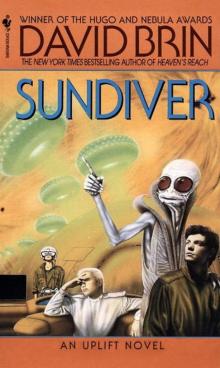 Sundiver
Sundiver Brightness Reef
Brightness Reef Existence
Existence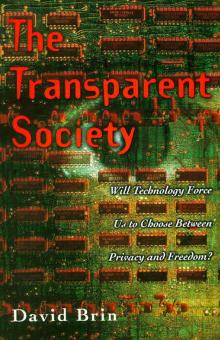 The Transparent Society
The Transparent Society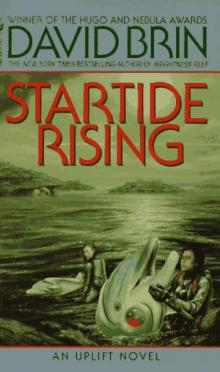 Startide Rising
Startide Rising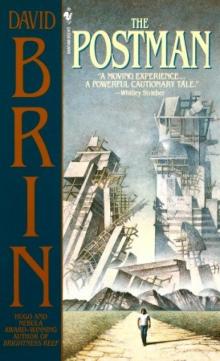 The Postman
The Postman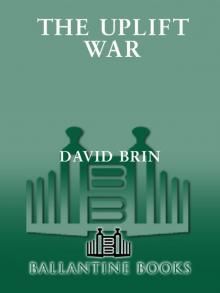 The Uplift War
The Uplift War The Loom of Thessaly
The Loom of Thessaly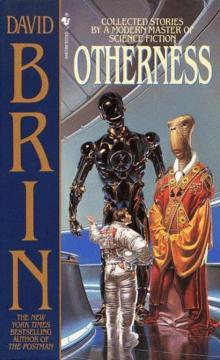 Otherness
Otherness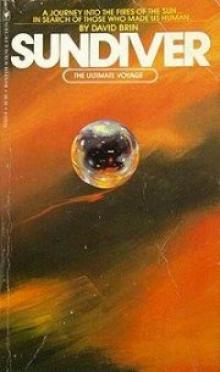 Sundiver u-1
Sundiver u-1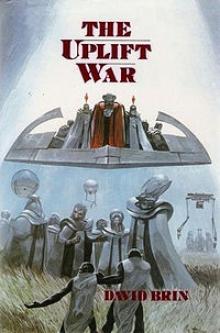 The Uplift War u-3
The Uplift War u-3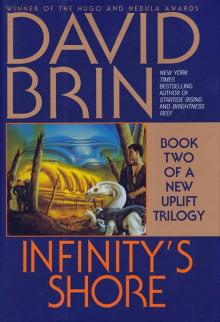 Infinity's Shore u-5
Infinity's Shore u-5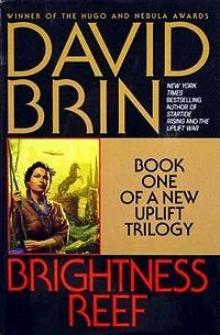 Brightness Reef u-4
Brightness Reef u-4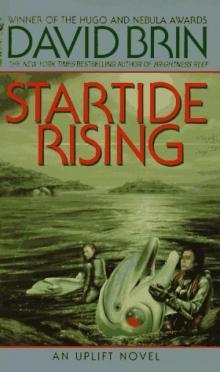 Uplift 2 - Startide Rising
Uplift 2 - Startide Rising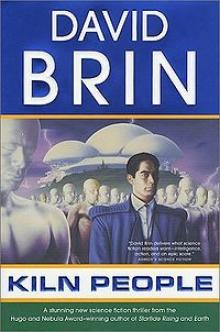 Kiln People
Kiln People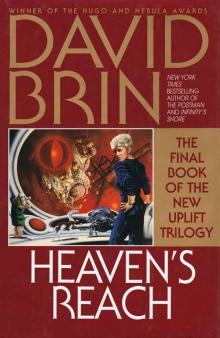 Heaven's Reach u-6
Heaven's Reach u-6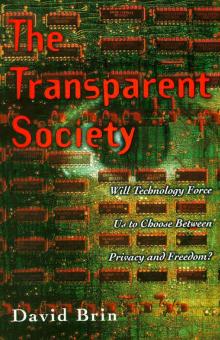 The Transparent Society: Will Technology Force Us to Choose Between Privacy and Freedom?
The Transparent Society: Will Technology Force Us to Choose Between Privacy and Freedom?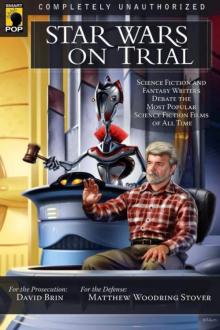 Star Wars on Trial
Star Wars on Trial Lungfish
Lungfish Tank Farm Dynamo
Tank Farm Dynamo Just a Hint
Just a Hint A Stage of Memory
A Stage of Memory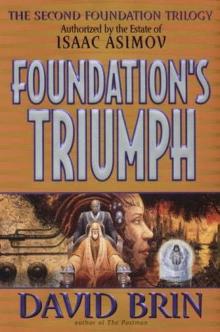 Foundation’s Triumph sf-3
Foundation’s Triumph sf-3 Thor Meets Captain America
Thor Meets Captain America Senses Three and Six
Senses Three and Six The River of Time
The River of Time Chasing Shadows: Visions of Our Coming Transparent World
Chasing Shadows: Visions of Our Coming Transparent World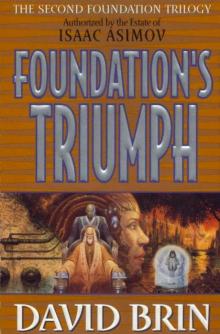 Foundation's Triumph
Foundation's Triumph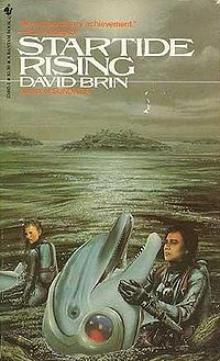 Startide Rising u-2
Startide Rising u-2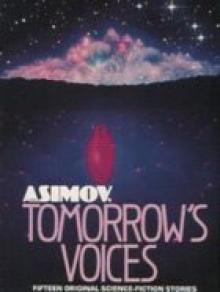 The Fourth Vocation of George Gustaf
The Fourth Vocation of George Gustaf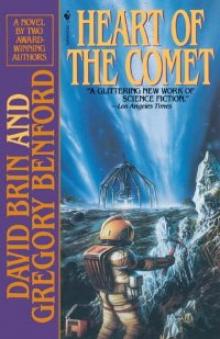 The Heart of the Comet
The Heart of the Comet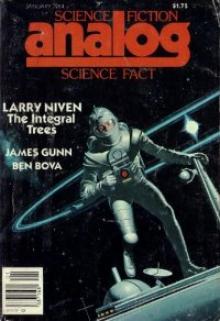 The Crystal Spheres
The Crystal Spheres